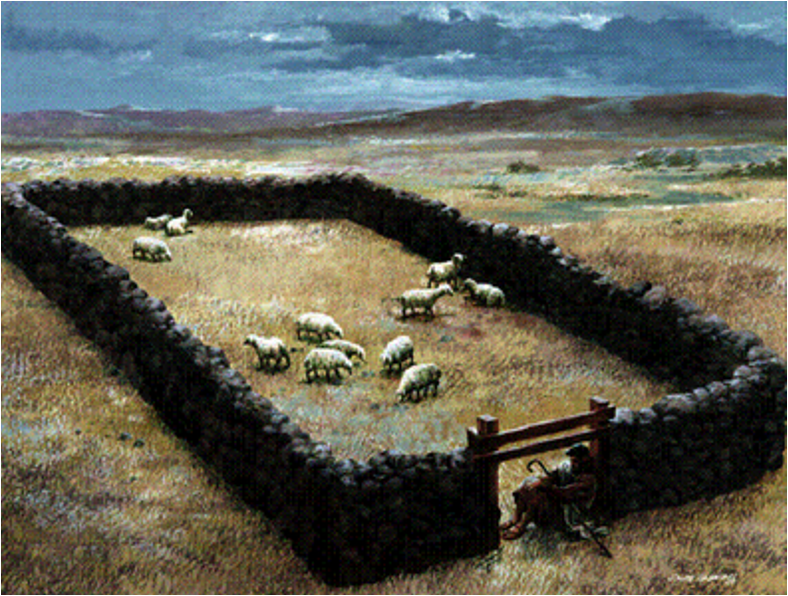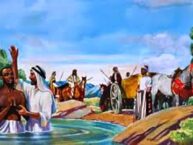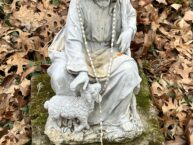 April 30, 2023: May God’s words be spoken, may God’s words be heard. Amen.
April 30, 2023: May God’s words be spoken, may God’s words be heard. Amen.
Happy Easter everyone!
Well, if you haven’t figured it out by all the readings we have heard this morning, the Fourth Sunday of Easter is always Good Shepherd Sunday. Now, Jesus as a shepherd is not a new thing to us, certainly not if we have ever seen any sort of image made of Jesus in Sunday School, or the internet. But, in our quest for this liturgically interesting annual thing we do, we run the risk of missing the point that the gospel assigned for these Sundays is trying to make.
Jesus in the Gospel of John has a narrative pattern: sign, discussion, discourse. All three parts are one story. Jesus will do something that shows he is the son of God – changing water into wine, raising Lazarus from the dead, healing the blind, that sort of thing. Then there is a discussion about it by those who witness it – often challenging Jesus. Then Jesus explains everything to his disciples.
This passage we heard today was that last part – Jesus explaining everything to his disciples – but without the sign or the discussion! It’s like saying that Harry Potter is the chosen one who will defeat Voldemort and break the Elders Wand, without telling you anything more. The chosen one of what? Who is Voldemort? What is an Elder Wand?
The thing is, we are being dropped into the end of a story that began in chapter 9. Without that chapter, this one is hard to really understand. And because we have tamed this gospel passage to a nice cozy image of Jesus with a sheep on his shoulders, we have also lost its power, and its incredible meaning for us today.
So, that said, let’s start at the beginning: The sign. We heard this story just a few weeks ago on the Fourth Sunday in Lent. Jesus saw a man who was blind from birth. He puts something on the mans eyes and tells him “Go, wash in the pool of Siloam.” The blind man listened to him, went and washed, and he could then see. Sign complete.
Now for the discussion: First, folks had to decide if this was really the same guy, which his parents affirmed. Then the temple authorities question his parents and the man about who healed him and whether he actually was blind at all. Not to mention his own disciples trying to figure out if he or his parents sinned that the guy was blind in the first place. Finally, not satisfied with the answers the man gave them, the temple leaders kick him out of the community. Jesus found out about it, seeks the man out, and includes him in the community of his followers. Discussion complete.
And now to today’s episode on the Jesus Channel – the discourse with his disciples. And here’s the thing about what we just heard – he does NOT say he is the good shepherd! That is the next verse, John 10:11, which will be read on this very Sunday next year, Year B. Sure, he TALKS about shepherds, but he doesn’t say he is one – not yet. In Year A, we get John 10:1-10, and Jesus is using one of the famous “I Am” statements we get in this gospel not once, but twice. But it isn’t to say “I am the great shepherd.” Instead he says “I am the door for the sheep.” It is translated as gate, so that we understand the imagery better, but it is actually the word door. He proclaims “I am the door” twice before he ever says “I am the good shepherd.” So clearly, Jesus as the door is what he wants his followers to know first and foremost in response to his healing of the blind man.
I mean, this really should be Door Sunday, but you don’t see a lot of images for that in religious art, and I haven’t heard a lot of Jesus Is My Door hymns, have you? It might be catchy [sung to Hyfrydol] “Jesus Christ, is my doooooor, and he leaves it open for me.” Well, maybe not.
But hymns and art aside…the disciples don’t understand.
The question for us is – do we?
Well, we may not understand Jesus fully, at least for the moment, but we sure do understand doors. We have red ones at church, all sorts of colors for them on our homes, storm doors to keep out the weather, screen doors to let the weather in, even revolving ones. But it might be helpful to set this passage in its context. Sheep pens didn’t actually have doors, or gates. So what on earth is Jesus talking about?
Sheep pens then, and even in some parts of the world today, are walled areas where sheep come to get rest after being out in the fields. They know they are safe there because the shepherd will lay across the open space the sheep enter and exit by. This way, if anything other than a sheep attempts to cross, the shepherd will stop it. To see what this looks like, check out the front cover of your bulletin that Candice, our Director of Communications, found to match the lectionary.
In the pen there are also sheep of other shepherds there too, as Jesus explains, and they will come out of the pen only to the sound of their particular shepherd’s voice. Then they know it is safe to go out into the pasture where their shepherd will lead them.
So, Jesus is saying that he will be the one laying across that open area, or leading his sheep out into the pasture when they hear his voice.
But most of all, remember that Jesus isn’t talking about being the door just because it popped into his head as they walked along. He is saying it in response to what happened to the blind man. Because once that man could see, he ran into a door he never saw coming – the one that closed him off from his community when the leaders kicked him out. The door of exclusion.
Now that is a door we all know well too, don’t we?
In fact, the church is great at being exactly that type of door through the centuries, sometimes using verses like this one we heard today to say some folks are part of the God crowd, and others are not. Yup – you will find plenty of preachers who will tell you that Jesus is trying to say that he is a gatekeeper who will not let anyone who isn’t his follower into the big Christian sheep pen, and all the others are doomed. Good Lord, deliver us.
This is what happens when we take snippets of scripture out of context and use it to justify the God we created in our own image. We must always remember our blind man to really understand what Jesus is teaching us. And in that story, when Jesus heals the man who was born blind, the religious leaders exclude the man from the synagogue. Why then would Jesus tell his followers that he is also an exclusionary door for the community of his followers? He doesn’t. In fact, in later verses, Jesus says “I have other sheep that do not belong to this fold. I must bring them also, and they will listen to my voice. So there will be one flock, one shepherd.”
Jesus isn’t acting as a gatekeeper to exclude, but as a door to guard against all that threatens the well-being of the sheep. He is talking about those who exclude, who cast away people they don’t understand, who judge others harshly, who accuse rather than love, who harm rather than heal. In other words, he is talking about the temple leaders who cast out this now sighted man from his community. Jesus heard about it, finds the man, and includes him in his fold.
But there is more to what he needs his disciples to understand, and so he tells them why he does this, why he came among them. He adds, “I came that they may have life, and have it abundantly.”
For me, there is no better statement in all of scripture for why God chose to become incarnate, to dwell among us, knowing the cost.
“I came that they may have life, and have it abundantly.”
Jesus, the door, came that we may have abundant life.
What does this mean for us, who follow him today?
Well, once again, it is helpful if we remember the man who whom Jesus healed. The reality was that he was excluded long before he was cast out of the community after his encounter with Jesus. As one who was blind, he was already on the margins – pushed to the side and dependent on the goodness of others for his life, he was not able to live freely. This is not something foreign to us, is it?
Today we find this same man in those who seek refuge, in those who love differently, in women and girls, in people of color, in the differently abled, in the aged and the young, in the addicted and the imprisoned, in the mentally and spiritually suffering, and in those who hunger and thirst. Jesus will always see them, go to them, heal them, and bring them into his care.
We will find the temple authorities today too, especially among those who profess to follow Jesus, who exclude the ones most in need of love, who judge, who abuse.
And most of the world also has a different view of what abundant life is. Rather than it being about living a life of meaning, of purpose, of love, some believe it means getting everything we want, or doing whatever we want when we want. And, when others have similar dreams, to stop them – as though somehow someone else having what we ourselves strive for means we can’t have it too. Worse, when things don’t go our way, at least in this country lately, when we don’t get what we want, we don’t turn to prayer that we may remember what is truly important – oh no – we go pick up an AR-15 and shoot into a crowd. Just last night five people were killed, including an 8 year old boy, because they had the audacity to ask their neighbor to stop shooting his guns at night so their child could sleep peacefully. There are no words.
The thing is, abundant life isn’t something we try to get – it is something that happens when we live into our lives in Christ. And to do that, we need to allow Jesus to heal us of blindness to the suffering of others, heal us of our arrogance and greed to try to build an abundant life apart from God, heal us of our brokenness out of which we harm others.
Folks, this bigotry, hatred, and violence that has infected us are the very thieves, bandits, and later wolves Jesus was speaking about in John 10. Lately it seems that cruelty is the point – the more hurtful you are, the more powerful you become. It is exhausting, painful, and deeply troubling.
Thankfully, Jesus is our door too, offering us a place of rest from the world, and we sure have need of it today. For we are tired and worn out by the snarling, the killing, the hurtfulness that seems to be pervasive in the pasture in which we live. And here, together in our sheep pen, we are nourished by Jesus at this table, and given sanctuary.
Yet, we who follow him, who follow the one who is a door for the sheep, must follow his voice as he leads us out into the world too. For we were not meant to stay here asleep in our pens. Our abundant life is only truly possible when we hear his voice, and join with Jesus in his work in the world to include, to heal, to love, and to care for all the children of God.
The one who healed the sick, gave sight to the blind, and freed the captive is offering this to us today – calls us to join him in this life giving work, and by that, live the life he hopes for us. And living that life means that we are also the very doors through which the excluded may find God’s all abiding grace and love, and by which those who would harm any child of God are thwarted.
The blind man, the sheep, and the door are metaphors for all disciples of Jesus. We are healed, we are invited into community, into the abundant life of Christ.
Jesus is calling us, calling you and me, to listen to his voice, to be healed, to be pulled together into this community – that we may be nourished in him, and find respite for our souls in this sheep pen we call Christ Church.
And Jesus is also calling us, calling you and me, to listen to his voice, and leave this sheep pen of our parish walls. For he will lead us to enter into the pasture of the world, to the people others do not see, that we live the life he modeled for us, and be:
A healing balm of love.
A door of life.
A caretaker of God’s children.
And by this we will truly have life, and have it abundantly.
Amen.
For the audio, click below, or subscribe to our iTunes Sermon Podcast by clicking here (also available on Audible):
The Rev. Diana L. Wilcox
Christ Church in Bloomfield & Glen Ridge
April 30, 2023
The Fourth Sunday of Easter – Year A
1st Reading – Acts 2:42-47
2nd Reading – 1 Peter 2:19-25
Gospel – John 10:1-10






